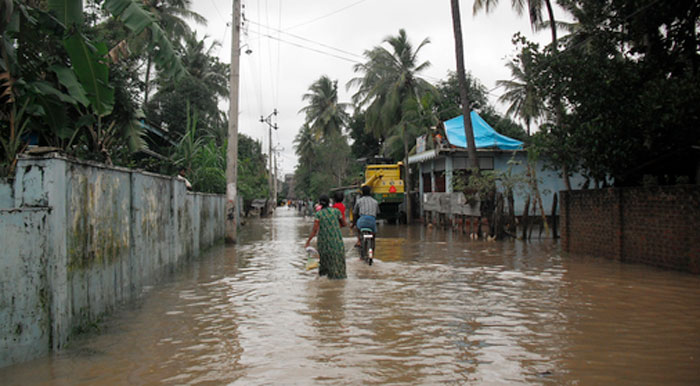
Flooding in Sri Lanka, 2010. Credit: Nonviolent Peaceforce/Flickr
Responding to climate change and environmental risks in fragile states needs to be approached at the local level, looking at the root causes of vulnerability and addressing these factors to build resiliency. These were the key takeaways from a roundtable discussion, co-hosted by the International Peace Institute (IPI) and International Alert, held at IPI on May 15th.The roundtable featured Janani Vivekenanda of International Alert, Samuel Doe of the United Nations Development Programme, and Michael Kugelman of the Woodrow Wilson Center.
The following insights emerged from the discussion:
1. Climate change and conflict are interrelated, yet little attention has been given to understanding the complex relationship on the ground. Climate change intensifies conflict, while conflict poses significant challenges to adapting to environmental change.
2. Environmental risks related to climate change plays a role in migration which contributes to conflicts between host communities and settlers. Although migration can benefit communities that rely on remittances, for others, the impact can outweigh the financial benefits. Migration also increases competition for scarce resources, such as water, in host communities that are often unprepared for the influx of people.
3. At the policy level, effective strategies should consider variability and uncertainty. Climate and environmental change affects communities in ways that are different from past experiences. Research and policy responses should understand granularity in diverse contexts, address governance issues and the underlying factors of vulnerability to climate and conflict, and strengthen local resiliency in order to effectively target the most marginalized.
4. Reorganizing communities is a key challenge. Many vulnerable societies are dependent on climate sensitive agricultural livelihoods. Better access to education is needed for the next generation in order to increase alternatives to income.
5. Climate change is a global issue with a local impact. More focus should be given to strengthening local resiliency and increasing the capacity to adapt to future environmental risks. In fragile states, local communities can take on key governance roles in managing resources while national policy can provide the necessary support.







